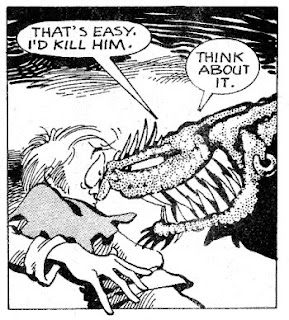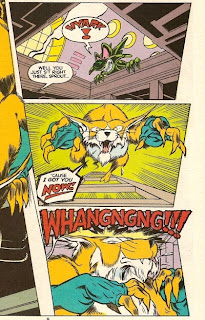
 In 1988, comics were going through a transition. Alan Moore had popularized a newer, darker approach to super-hero comics with his triple play of Miracleman, Swamp Thing and Watchmen.
In 1988, comics were going through a transition. Alan Moore had popularized a newer, darker approach to super-hero comics with his triple play of Miracleman, Swamp Thing and Watchmen.Frank Miller had then applied that approach to Batman in Batman: The Dark Knight Returns, taking Batman back to his dark roots with a pulpy hard-edged storytelling style, following that success with the gritty Batman: Year One. In only a couple of years, the standard view of Batman had gone from a boringly noble knight of the night to a borderline psychopath, obsessed with cleaning the scum off the streets.
On the other side of the aisle, the most popular character for Marvel had become, astoundingly, Wolverine, an invincible little savage with super-sharp metal claws that extended from his hands, which he used on bad guys after flying into "berserker rages."
I say 'astoundingly' because Wolverine still appeared in books approved by the Comics Code Authority. Imagine if ABC had done a Saturday morning series in 1985 about Jack the Ripper. Think of the hoops they'd have to jump through to make sure his adventures passed Standards and Practices. Now imagine that they turned him into the hero of the show. That was Wolverine in the 80's.
So in 1988, out of Canada came Faust.
Issue #1 starts out with an editorial on the inside front cover saying:
And yes, this book is not for wussies. There is nothing I hate worse than listening to a person (think yuppie) talking about Faust - "Oh my, look at all the blood"...
Hey, we're not breaking your legs and trying to force feed you the book (although we should).
After that rather aggressive anti-sales pitch comes "A Letter From the Writer," David Quinn, describing the origins of the character in mock poetic terms and hilariously asserting that "If you slam through day and night in death, you might learn to appreciate the sanctity of life."
 Hilariously, because nothing in the story that follows can be even loosely interpreted as sacred. The story opens with a shallow self-absorbed reporter encountering a street hooker who appears to be coaxing him into performing oral sex on her right there on the street corner (it should be noted that the story takes place in pre-Giuliani New York City, so this could very well have been a realistic portrayal).
Hilariously, because nothing in the story that follows can be even loosely interpreted as sacred. The story opens with a shallow self-absorbed reporter encountering a street hooker who appears to be coaxing him into performing oral sex on her right there on the street corner (it should be noted that the story takes place in pre-Giuliani New York City, so this could very well have been a realistic portrayal).After a few pages of sex/murder featuring characters who may or may not have anything to do with the story in later issues, we're introduced to Jade DeCamp, a psychologist who has recently quit her job at an institute for the criminally insane. One of her patients has recently died, and she suspects evil doings, so she has stolen his file (and a scalpel, for some reason).
However, it turns out that her patient, John Jaspers, is not dead. He's continuing his art therapy in a tenement room somewhere in the city, after which he dons a mask and cape and takes to the rooftops. Soon, he rescues De Camp and the reporter from a street gang, by slicing the thugs to ribbons with metal claws that extend from his gloves.
 And here we see the true nature of the book. Faust is Batman gone full-bore psycho, without the Warner franchise hanging like a PC anchor around his neck. Faust is Wolverine in full berserker rage mode, without the Comics Code authority turning our faces away from the ugly truth of the character. Faust is the culmination of the trend started by Miracleman and Swamp Thing, but not limited by taste or talent.
And here we see the true nature of the book. Faust is Batman gone full-bore psycho, without the Warner franchise hanging like a PC anchor around his neck. Faust is Wolverine in full berserker rage mode, without the Comics Code authority turning our faces away from the ugly truth of the character. Faust is the culmination of the trend started by Miracleman and Swamp Thing, but not limited by taste or talent.I never read past the first issue. I was intrigued enough by Tim Vigil's art--detailed and dynamic, with definite traces of Eisner between the blood spatters--to buy the first one, but the story was a trudge through a sewer--an incoherent, pretentious sewer at that, full of adolescent, angsty poeticizing.
I can imagine that for a certain breed of fanboy, there was satisfaction to be found in seeing all those qualities that could only be implied in their favorite mainstream heroes brought out into the light. There must have been, because Faust, unlike some of the other books I've brought out of the Vault, lasted for a good long run and was even adapted into a movie. But for me, one issue of the Wolve-Bat was enough.













